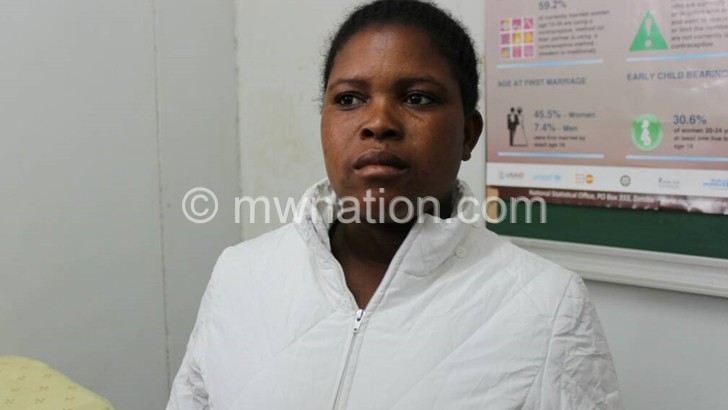Breaking barriers in family planning
Four years ago, Chiradzulu district had the lowest number of women accessing modern family planning methods at only 30 in 100. Today, 68 percent determine freely the number and spacing of their children—higher than the national average estimated at 55 percent.
Family planning in the country is often associated with myths and misconceptions. Some fear contraception will make them barren.
But in 2015, Jennifer Namoto, 24, went against the current when she settled for an injection.

“I ignore what people say. I just want my child to grow well before having another one,” says the woman from Ngumwiche Village in Traditional Authority (T/A) Mpama, Chiradzulu.
In Chiradzulu, even the youth and unmarried women are using contraceptives to prevent unwanted pregnancies.
Grace Gama from Lupinga Village in Mpama, uses the Depo-Provera (injection)
“I became pregnant in 2014 when I was 18. Now, I take the injection every five months to prevent this from happening again,” she says.
Form Three student Lyness Sangachi, from Chilanga Village T/A Kadewere, uses contraceptives to avoid teen pregnancies which force many girls to drop out of school.
According to the 2015 Malawi Demographic Health Survey, 29 percent of adolescent girls in the country face devastating effects of teen pregnancies.
“I don’t want unwanted pregnancy before completing school,” says Lyness, 19.
Challenges
Some cultural beliefs and stereotypes prevent more women from using contraceptives, says Phalombe district family planning co-ordinator Ganiza Paul.
“Women are called all sorts of names. They are shamed by their communities,” he says.
But the story is different in Chiradzulu, which has 15 health facilities serving a population of about 332 000.
The district health office (DHO) has introduced several initiatives to overcome these challenges identified by assessments conducted in 2014.
“We discovered in communities women were not accessing family planning services because clinics were far away. So we trained health surveillance assistants [HSAs] to go out and provide pills, condoms and injections in these hard-to-reach areas,” says the district family planning services coordinator Joseph Somanje.
The DHO works closely with village heads, religious leaders and the youth to encourage the locals to embrace modern family planning.
According to Village head Mgunda, the villagers have formed committees to reach out to more women.
“We are working hard to encourage them to use family planning methods,” says Mgunda.
Also pivotal to the increased uptake of contraceptives in Chiradzulu are community-based agents (CBDA) who distribute condoms and pills.
Milepa CBDA chairperson Symon Muliya serves about 148 people, he says.
“Many women want to use family planning, but we need to do more to reach out to the youth,” he says.
Seven of the 15 health facilities in Chiradzulu have youth-friendly corners and peer educators help others get condoms and pills.
The youths comprise a third of the population accessing family planning services.
“We reach out to the youth who don’t come to a health facility because they are shy. Even now we are involving their teachers in a programme called safeguard young people,” says Somanje.
Every day, Chiradzulu District Hospital sees about 100 women. The number doubles on Monday, a day dedicated to family planning service delivery.
In the district, the popular method is the injection. Nearly 60 percent of women use this. Thirty percent use implants while 10 percent settle for pills and other methods.
Statistics from the DHO shows that almost 22 percent of women of childbearing age got pregnant in 2014. The figure has slumped to 14 percent this year.
“The population has not increased as alarmingly as we expected. Many people, especially the youth, are using condoms to prevent unwanted pregnancies and sexually transmitted infections,” says Somanje.
Ministry of Health and Population spokesperson Joshua Malango hails various organisations, including Pakachere Institute for Health and Development and United Nations Population Fund (UNFPA), for increasing the demand for sexual reproductive health services (SRHS), especially family planning.
“Since World Health organisation [WHO] declared family planning a human rights issue, many Malawians have been demanding family planning services. However, the major challenge is lack of contraceptive materials at times. This should be district councils’ responsibility. They make their own healthcare budgets to procure enough drugs and supplies,” says Malango.





